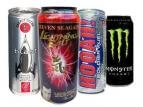Allyson Dickman>Senior>Journalism>University of Maryland
 In the world of college students, all-nighters are a fact of life. With crowded schedules, living two feet from our party-hungry friends, and piles of homework, staying up isn’t easy—so many reach for energy drinks like Red Bull and Monster to keep their heavy eyelids open.
In the world of college students, all-nighters are a fact of life. With crowded schedules, living two feet from our party-hungry friends, and piles of homework, staying up isn’t easy—so many reach for energy drinks like Red Bull and Monster to keep their heavy eyelids open.
As students’ lives become more hectic, energy drink usage becomes more frequent. “One of my friends was addicted to Red Bull, she had it six times a day,” said Chelsea Krost, a freshman at Marymount Manhattan College and host of the radio show, Teen Talk Live. “When she stopped she went through withdrawal, she gained weight, had headaches.”
The energy drink market is profiting off our dependency on drinks like Amp and Rockstar, making $5.4 billion a year and growing. In 2007 energy drinks were consumed at a volume of 290 million gallons in the United States. But what students may not realize as they slurp the drinks down is they are risking their health with loads of caffeine, empty calories and tons of sugar. “Turning to energy drinks is only going to give you that quick fix,” said Krost, “and then the crash and burn is going to come.”
And most students don’t drink energy drinks in moderation, or realize that our bodies can’t take a lot of caffeine. Health authorities worldwide recommend only having an intake of 400 milligrams of caffeine per day. Drinks like Red Bull have only 80 milligrams per can, but other energy drinks like Fixx have 500 milligrams of caffeine in one can.
Drinking one Red Bull won’t kill you, but having multiple could lead to caffeine intoxication, causing insomnia, nervousness, headaches, stomach pain, anxiety and confusion. And mixing energy drinks with alcohol can be even more dangerous, combining a stimulant with a depressant. Red Bull and vodka combinations have been linked to multiple deaths in the past few years.
Dr. Eric Plasker, author of best-selling book, The 100 Year Lifestyle, recommends healthier alternatives to energy drink fixation. Students who need to stay up should eat “high-energy foods” like whole grains, fruits and veggies, tofu and lean meats. They should also engage in “high-energy activities” not just limited to exercise, but including meaningful work and change-of-pace activities.



















